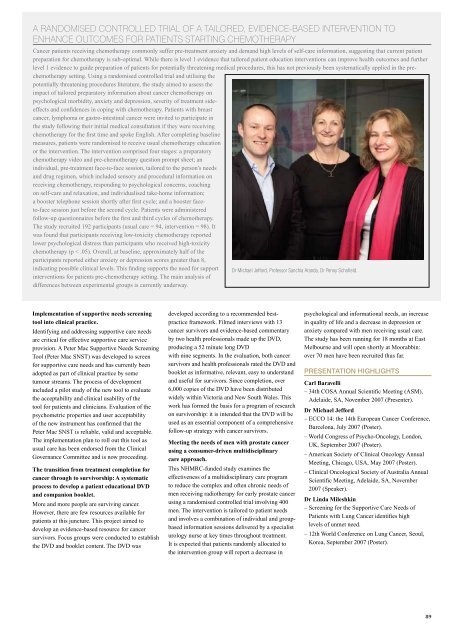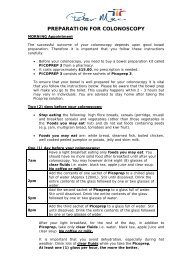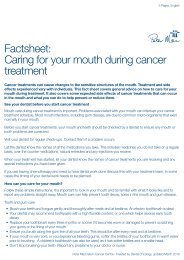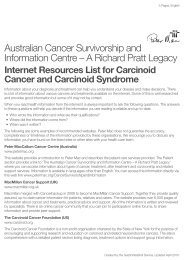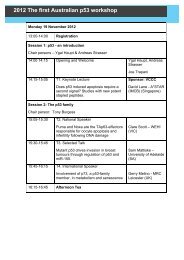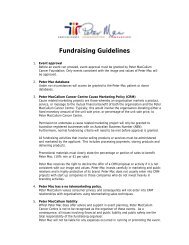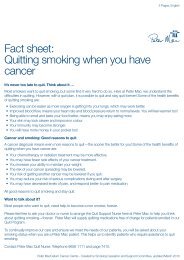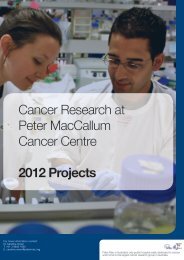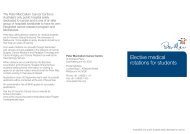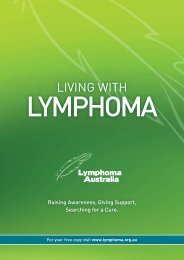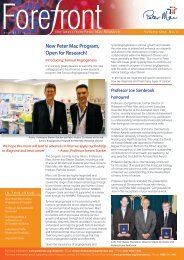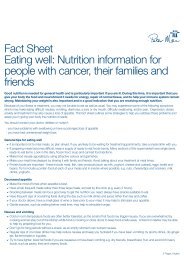RESEARCH REPORT - Peter MacCallum Cancer Centre
RESEARCH REPORT - Peter MacCallum Cancer Centre
RESEARCH REPORT - Peter MacCallum Cancer Centre
Create successful ePaper yourself
Turn your PDF publications into a flip-book with our unique Google optimized e-Paper software.
a ranDoMiseD ControLLeD triaL of a taiLoreD, eviDenCe-BaseD intervention to<br />
enhanCe outCoMes for patients startinG CheMotherapY<br />
<strong>Cancer</strong> patients receiving chemotherapy commonly suffer pre-treatment anxiety and demand high levels of self-care information, suggesting that current patient<br />
preparation for chemotherapy is sub-optimal. While there is level 1 evidence that tailored patient education interventions can improve health outcomes and further<br />
level 1 evidence to guide preparation of patients for potentially threatening medical procedures, this has not previously been systematically applied in the prechemotherapy<br />
setting. Using a randomised controlled trial and utilising the<br />
potentially threatening procedures literature, the study aimed to assess the<br />
impact of tailored preparatory information about cancer chemotherapy on<br />
psychological morbidity, anxiety and depression, severity of treatment sideeffects<br />
and confidences in coping with chemotherapy. Patients with breast<br />
cancer, lymphoma or gastro-intestinal cancer were invited to participate in<br />
the study following their initial medical consultation if they were receiving<br />
chemotherapy for the first time and spoke English. After completing baseline<br />
measures, patients were randomised to receive usual chemotherapy education<br />
or the intervention. The intervention comprised four stages: a preparatory<br />
chemotherapy video and pre-chemotherapy question prompt sheet; an<br />
individual, pre-treatment face-to-face session, tailored to the person’s needs<br />
and drug regimen, which included sensory and procedural information on<br />
receiving chemotherapy, responding to psychological concerns, coaching<br />
on self-care and relaxation, and individualised take-home information;<br />
a booster telephone session shortly after first cycle; and a booster faceto-face<br />
session just before the second cycle. Patients were administered<br />
follow-up questionnaires before the first and third cycles of chemotherapy.<br />
The study recruited 192 participants (usual care = 94, intervention = 98). It<br />
was found that participants receiving low-toxicity chemotherapy reported<br />
lower psychological distress than participants who received high-toxicity<br />
chemotherapy (p < .05). Overall, at baseline, approximately half of the<br />
participants reported either anxiety or depression scores greater than 8,<br />
indicating possible clinical levels. This finding supports the need for support Dr Michael Jefford, Professor Sanchia Aranda, Dr Penny Schofield.<br />
interventions for patients pre-chemotherapy setting. The main analysis of<br />
differences between experimental groups is currently underway.<br />
Implementation of supportive needs screening<br />
tool into clinical practice.<br />
Identifying and addressing supportive care needs<br />
are critical for effective supportive care service<br />
provision. A <strong>Peter</strong> Mac Supportive Needs Screening<br />
Tool (<strong>Peter</strong> Mac SNST) was developed to screen<br />
for supportive care needs and has currently been<br />
adopted as part of clinical practice by some<br />
tumour streams. The process of development<br />
included a pilot study of the new tool to evaluate<br />
the acceptability and clinical usability of the<br />
tool for patients and clinicians. Evaluation of the<br />
psychometric properties and user acceptability<br />
of the new instrument has confirmed that the<br />
<strong>Peter</strong> Mac SNST is reliable, valid and acceptable.<br />
The implementation plan to roll out this tool as<br />
usual care has been endorsed from the Clinical<br />
Governance Committee and is now proceeding.<br />
The transition from treatment completion for<br />
cancer through to survivorship: A systematic<br />
process to develop a patient educational DVD<br />
and companion booklet.<br />
More and more people are surviving cancer.<br />
However, there are few resources available for<br />
patients at this juncture. This project aimed to<br />
develop an evidence-based resource for cancer<br />
survivors. Focus groups were conducted to establish<br />
the DVD and booklet content. The DVD was<br />
developed according to a recommended bestpractice<br />
framework. Filmed interviews with 13<br />
cancer survivors and evidence-based commentary<br />
by two health professionals made up the DVD,<br />
producing a 52 minute long DVD<br />
with nine segments. In the evaluation, both cancer<br />
survivors and health professionals rated the DVD and<br />
booklet as informative, relevant, easy to understand<br />
and useful for survivors. Since completion, over<br />
6,000 copies of the DVD have been distributed<br />
widely within Victoria and New South Wales. This<br />
work has formed the basis for a program of research<br />
on survivorship: it is intended that the DVD will be<br />
used as an essential component of a comprehensive<br />
follow-up strategy with cancer survivors.<br />
Meeting the needs of men with prostate cancer<br />
using a consumer-driven multidisciplinary<br />
care approach.<br />
This NHMRC-funded study examines the<br />
effectiveness of a multidisciplinary care program<br />
to reduce the complex and often chronic needs of<br />
men receiving radiotherapy for early prostate cancer<br />
using a randomised controlled trial involving 400<br />
men. The intervention is tailored to patient needs<br />
and involves a combination of individual and groupbased<br />
information sessions delivered by a specialist<br />
urology nurse at key times throughout treatment.<br />
It is expected that patients randomly allocated to<br />
the intervention group will report a decrease in<br />
psychological and informational needs, an increase<br />
in quality of life and a decrease in depression or<br />
anxiety compared with men receiving usual care.<br />
The study has been running for 18 months at East<br />
Melbourne and will open shortly at Moorabbin:<br />
over 70 men have been recruited thus far.<br />
presentation highlights<br />
Carl Baravelli<br />
– 34th COSA Annual Scientific Meeting (ASM),<br />
Adelaide, SA, November 2007 (Presenter).<br />
Dr Michael Jefford<br />
– ECCO 14: the 14th European <strong>Cancer</strong> Conference,<br />
Barcelona, July 2007 (Poster).<br />
– World Congress of Psycho-Oncology, London,<br />
UK, September 2007 (Poster).<br />
– American Society of Clinical Oncology Annual<br />
Meeting, Chicago, USA, May 2007 (Poster).<br />
– Clinical Oncological Society of Australia Annual<br />
Scientific Meeting, Adelaide, SA, November<br />
2007 (Speaker).<br />
Dr Linda Mileshkin<br />
– Screening for the Supportive Care Needs of<br />
Patients with Lung <strong>Cancer</strong> identifies high<br />
levels of unmet need.<br />
– 12th World Conference on Lung <strong>Cancer</strong>, Seoul,<br />
Korea, September 2007 (Poster).<br />
89


